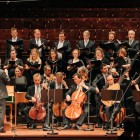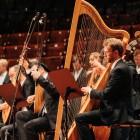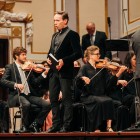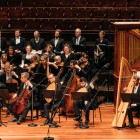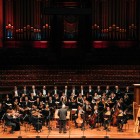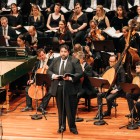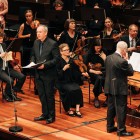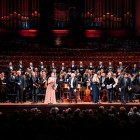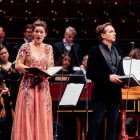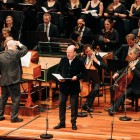Saul 2022Edinburgh International Festival
Read more about the opera Saul
The Festival has at last begun to perform some of Handel's great oratorios. Perhaps it is too much to ask that one should be an annual event, but why not? They all contain plenty of good quality music drama. It is twenty-five years since Saul was last heard, and then the cast was a superb assembly led by Bryn Terfel in the title role. The others included Lisa Milne, Joan Rodgers, Ian Bostridge and David Daniels. Need one say more?
- But for the fact that the short roles of Doeg and the Ghost of Samuel were taken by Neal Davies - and here he was at last as Saul himself, though we should perhaps mention that he played the same character in Charpentier's earlier David et Jonathas in a fully-staged production exactly a decade ago. He gave a powerful performance as he descends into madness, only realising at the end the importance of his children, particularly his unloved son.
The leading British counter-tenor of the day, Iestyn Davies, arrived as David. He has several moving airs as he develops in majesty, revealing his frustration with Saul's increasing irrationality. Perhaps his friendship with Jonathan is understated in the Jennens text, by comparison with the earlier French operatic version - they tend to appear separately, rather than together. The Canadian tenor Andrew Haji gave a sensitive performance as Jonathan, while his sisters Merab and Michal were well differentiated by Sophie Bevan and Liv Redpath.
James Gilchrist made much of the High Priest, adding the Witch of Endor for good measure. William Thomas used his attractive black-toned bass to splendid effect as Samuel's ghost summoned up by the Witch. The remaining short roles - Abner, Doeg, the Amalalekite messenger (who brings David news of the deaths of Saul and Jonathan) and the opening solo - were well taken by soloists stepping forward from the choir, which was an excellent body of voices.
The conductor originally scheduled was Bernard Labadie. He withdrew because of illness. His superbly dynamic replacement was none other than John Butt, local boy by adoption and long-term director of the Dunedin Consort. He also works with the English Concert, including a Bach Prom at the Royal Albert Hall a few days after Saul. His vigorous direction ensured that the performance was full of attractive features.
Important instrumental solos included a lovely obbligato for harp and what amounted almost to an organ concerto, both played beautifully. An obvious orchestral highlight, the famous Dead March, was put across with a great sense of restraint, and very moving as a result.
The crowded audience was justifiably enthusiastic.
Performance Cast
- David a young shepherd, conqueror of Goliath
- Saul King of Israel
- Jonathan son of Saul
- Merab daughter of Saul
- Michal daughter of Saul
- High Priest
- Abner Saul's Commander-in-Chief
- Doeg an officer of Saul
- Witch of Endor a Sorceress
- Ghost of Samuel a vision
- Amalekite
- Solo Voice
